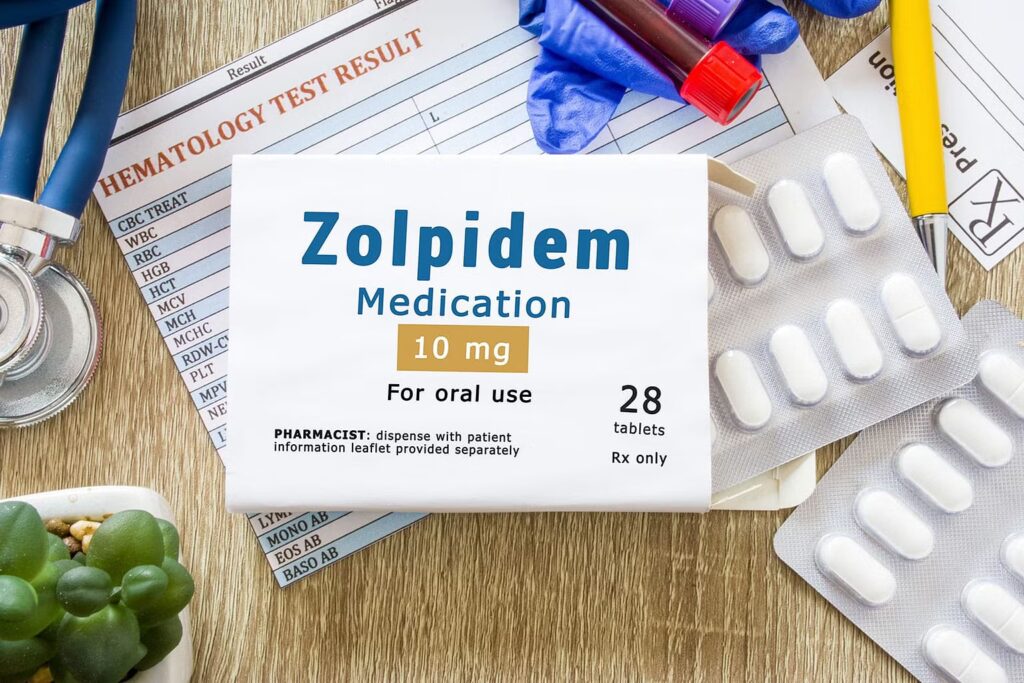Ambien (Zolpidem) Addiction Treatment in New Hampshire
Despite its tricky process, Ambien addiction is a treatable condition, so don’t hesitate to reach out for help if you or someone you love is struggling with it.
Home > Treatment > Sleeping Pills > Ambien
A lot of people in New Hampshire seek external medications to help them sleep comfortably at night. While Ambien is one of the most effective treatments used in this regard, it’s also known for its high potential for addiction.
If you or someone you love is struggling with Ambien addiction, this guide will help you find the right treatment by walking you through everything you need to know about the drug.
This article will also aid you in identifying the causes of Ambien addiction and how it develops, so you can find proper help.
What Is Ambien and How Does It Work?
Ambien is the brand name for the medication Zolpidem, which is a prescription short-term sleep aid used for the treatment of insomnia.
Zolpidem belongs to a group of drugs called “non-benzodiazepines” under the Imidazopyridines class. The name is to distinguish them from another family of sedatives/hypnotics, called “benzodiazepines”.

The drug works by enhancing the effects of a specific brain chemical (neurotransmitter) called GABA-A or gamma-aminobutyric acid A.
When activated, this neurotransmitter has a calming effect on the nervous system by slowing down its activity, making it much easier to fall asleep.
What makes Zopidem special is that it has a noticeably quick onset of action and a relatively short duration. This is why it’s commonly prescribed as a short-term insomnia treatment and sleep quality enhancer.
While effective for short-term use, Ambien has a potential for addiction, especially with long-term use.
How Dangerous Is Ambien Addiction?
Ambien addiction is a dangerous condition for a variety of reasons, ranging from negative effects on daily life to life-threatening consequences. Here’s an in-depth look at some of the key dangers associated with zolpidem abuse:
- As the body becomes dependent on Ambien, individuals develop withdrawal symptoms if they try to quit using the drug. These include nausea, vomiting, headache, muscle aches, and seizures (in severe cases).
- Overdosing on Ambien can cause respiratory failure, which can lead to coma or even death.
- Inability to sleep due to rebound insomnia leads to hallucinations and erratic behaviors that can seriously endanger a person’s life.
- The lack of coordination associated with Zolpidem use can lead to serious accidents
How Addictive Is Ambien?
Ambien is a regulated substance and is classified as a Schedule IV drug by the Controlled Substance Act.
This classification indicates that it has a moderate potential for abuse and addiction, despite having accepted medical uses.
This is because our bodies can develop quick tolerance to the drug, requiring higher doses to achieve the same sleep-inducing effect. This happens when taking it in higher doses than prescribed or combining it with other depressants or alcohol.
For that reason, even patients who are prescribed Ambien are warned against its high addictive potential and strictly advised to stick to the prescription dose to avoid developing dependence.
Causes and Factors That Lead to Ambien Addiction
Ambien is considered a unique case among addictive drugs because it’s rarely used for recreational purposes like some other medications.

In fact, the majority of people who suffer from Ambien addiction are individuals who were initially prescribed the drug.
Self-medication for Chronic Insomnia Patients
As previously established, Ambien is a treatment for short-term insomnia. This is because the drug loses its effectiveness when taken continuously for more than a few weeks.
For that reason, individuals suffering from chronic insomnia are at high risk of addicting the drug, especially when trying to self-medicate themselves.
Several studies and clinical trials also confirm that zolpidem has a rebound effect, where insomnia becomes even worse after the medication wears off. This challenging situation pushes people to take the drug more frequently at an increasing dose/rate to avoid sleep problems.
Underestimating the Effects of Ambien
Since Ambien is a prescription medication, a lot of people think that it’s not as dangerous as other heavily regulated drugs, and downplay its addictive potential.
As a result, many individuals start to ignore prescription instructions on the drug dosage to achieve easier sleep, which ends with quick tolerance and addiction.
Easy Access to Ambien
Individuals with easier access to Ambien, such as relatives of prescription users, may consider using the drug when having a hard time sleeping.
However, without medical approval or supervision, rebound insomnia can quickly build up and make it much harder to let go of the habit. This is also common among younger individuals who may try the drug out of curiosity.
Co-Occurring Mental Health Conditions
Individuals suffering from trauma, anxiety, depression, or other mental health conditions that contribute to insomnia may be more likely to misuse Ambien to cope with these issues.
How to Identify Ambien Addiction
Ambien addiction is a time-sensitive condition; the earlier you start treating it, the easier the treatment is going to be.
That’s why it’s essential to identify the signs of Ambien addiction, which can include both physical symptoms and behavioral signs. Here’s a quick look at some of them:
Physical Symptoms
- Excessive sleeping and fatigue throughout the day
- Impaired coordination and balance
- Lightheadedness
- Forgetfulness and memory lapses
- Loss of consciousness and fainting frequently
- Slurred speech
- Slow reactions and a noticeable lack of coordination
- Developing amnestic sleep-related eating disorders
- Hallucinations and delusions
- Shallow breathing and slow heart rate
- Blurry vision
Behavioral Signs
- Obtaining Ambien prescriptions from multiple doctors to maintain a steady supply of the drug (doctor shopping)
- Self-isolation and withdrawal from society
- Mood swings and irritability, especially with rebound insomnia
- Neglecting responsibilities, whether they’re social, academic, or professional
- Trying to source Ambien through illegal methods while disregarding the consequences
Ambien Addiction Treatment Options
Although Ambien addiction can be challenging, there are various treatment options that healthcare professionals can offer to achieve full recovery. Here’s a quick look at some of the common treatments for this addiction:
Medication-Assisted Detox and Rehab
The first and most critical step while treating Ambien is detoxification. As the name suggests, this is the stage where the zolpidem is removed from the body while managing the withdrawal symptoms associated with it.
This should always be done under medical supervision to gradually reduce the dose of Ambien, as sudden cessation of the drug can cause life-threatening symptoms. This can either be:
- Inpatient Treatment: Provides 24/7 medical supervision and intensive therapy in the rehab facility. This is the go-to option in severe cases.
- Outpatient Treatment: Allows individuals to live at home while attending regular therapy sessions and group meetings. This option provides more flexibility but requires a strong support system at home.
Doctors may also prescribe alternative treatments to help patients overcome rebound insomnia associated with Ambien detoxification.
Individual Counseling and Behavioral Therapy
Following detox, therapy becomes the cornerstone of addiction treatment. Individual counseling includes sessions to help individuals identify the root cause behind addiction in the case of coping using Ambien.
It’ll also teach patients to develop healthier methods to cope with stress and achieve better sleep.
Additionally, the sessions will also include well-established treatment methods to help patients better correct their thinking patterns and replace negative ideas with positive ones. This is known as cognitive behavioral therapy or CBT.
Additionally, therapists may also use other promising treatment methods, such as dialectical behavioral therapy and motivational interviewing, which focus on self-control and sticking to treatment to avoid relapse and abuse.
Group Therapy
Besides individual therapy, medical professionals will also recommend attending group sessions, which is a safe space where individuals struggling with similar challenges can share their experiences and learn from each other.
Participants can also gain encouragement from peers who understand the challenges of recovery, and build a support network to overcome the sensation of isolation associated with addiction.
Family Therapy
Addiction usually impacts the entire family or is the result of family problems. That’s why it’s important for families with broken relationships to reestablish trust and support for a reliable recovery.
This can also improve communication between family members, which should reduce the risks of relapses in the future.
Sober Living Homes
Sober living homes offer a safe and supportive environment during early recovery, especially for patients who spend a relatively long time treating Ambien addiction and don’t feel ready to get back to their daily lives.
Residents live with others committed to sobriety while being surrounded by healthcare providers. To maintain the safety of this structured environment, these accommodations usually have specific rules that everyone must follow.
Relapse Prevention Programs
Relapse is a common hurdle in addiction recovery, especially for tricky forms of dependence such as Ambien addiction. These programs equip individuals with the skills to identify triggers and develop a plan to counteract them.
This may involve learning to recognize early warning signs of relapse, such as increased stress or difficulty sleeping. It may also include enhanced well-being techniques like exercise, meditation, yoga, massage, acupuncture, etc.
Seeking Professional Medical Help with Ambien Addiction
Despite its tricky process, Ambien addiction is a treatable condition, so don’t hesitate to reach out for help if you or someone you love is struggling with it.
As you can see, there’s a wide range of methods to achieve a long-lasting recovery, so it’s important that you seek professional support to help you create a personalized treatment plan to maximize the chances of a successful recovery.
If you live in New Hampshire, talk to our addiction treatment experts at Live Free Recovery Services to take the first step towards a healthier and happier life.
Did this article answer your questions?
"*" indicates required fields
Take the First Step Towards a Brighter Tomorrow
At Live Free Recovery, we’re committed to walking alongside you on every step of your journey. Our compassionate team is here to provide the guidance and support you need to overcome addiction and reclaim your life. Don’t wait—reach out today to speak with someone who truly understands your struggles and can help you take that important first step toward healing and a fresh start.
Your path to recovery starts here.
